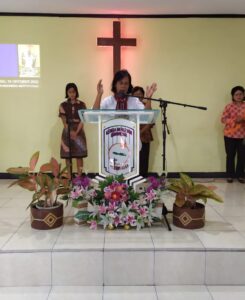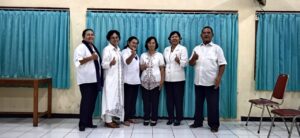
Ordained Women in Indonesia
The History and the Ongoing Support
At a doctrinal level, The Wesleyan Church has historically valued and affirmed women in various ministry and leadership roles. Though this might look differently throughout history and culture, the church has remained steadfast in the belief that God calls both men and women.
Former missionary Beth Fussner grew up as a missionary kid in the Philippines (1953-1970) seeing many women go into pastoral ministry within the Philippine Wesleyan Church. While there, she said the church was in an “all hands on deck” mindset, encouraging everyone to step into whatever God called them toward. Since Filipino Wesleyan missionaries – Rev. Dan and Deling Pantangan – initiated the Wesleyan church in Indonesia in 1970, the Indonesian Wesleyan Church has this same affirmation in its DNA.
In truth, Beth said she’s not even sure the same level of affirmation and acceptance of women in ministry existed in North America at the time.
 Following her youth in the Philippines, Beth went on to become a missionary with her husband Dr. Jeff Fussner, in Indonesia from 1983-1997. Along with other Wesleyan World Missions (now Global Partners) missionaries like Julia and Bob Smith and Freda Farmer, the Fussners taught at the Wesleyan Bible College. There, they taught and trained pastors and church leaders, which continues at the college today. Additionally, they taught students how to teach Christianity in public schools — since religion was a valued school subject and Christianity didn’t have much representation.
Following her youth in the Philippines, Beth went on to become a missionary with her husband Dr. Jeff Fussner, in Indonesia from 1983-1997. Along with other Wesleyan World Missions (now Global Partners) missionaries like Julia and Bob Smith and Freda Farmer, the Fussners taught at the Wesleyan Bible College. There, they taught and trained pastors and church leaders, which continues at the college today. Additionally, they taught students how to teach Christianity in public schools — since religion was a valued school subject and Christianity didn’t have much representation.
Some women entered the bible college feeling a clear calling to teach Christianity in public schools, as it was a way to contribute. Yet there were others, Beth said, who felt that their calling was pastoral. In an area that was fundamentally Muslim and male-dominated, Beth’s initial thought was “You’re very, very brave.”
While it seemed that there were many obstacles working against them, one thing they had going for them was the Wesleyan affirmation of women in ministry at a doctrinal level. “We could say to them ‘we will do everything we can to support you … Of course you’re going to do this! Let’s see how God helps you do that,’” Beth recalled.
Overall, graduates from the Bible college became important role models to subsequent ministry students. To ensure that the young women had necessary support and mentorship after graduation, Beth said she also provided them with a space to discuss their struggles and fears and to pray and learn together. For a time, the group met once a month, while they navigated church planting and pastoring.
The Superintendent of the Wesleyan Church at Java, Rev. Sri Wuryaningsih, agrees that young Christian women need role models and sources of inspiration as they grow in their faith. When she studied at the Wesleyan Bible College, Rev. Wuryaningsih met missionaries Julia Smith, Freda Farmer and Beth Fussner — and they became inspirations for her.
Though some of Rev. Wuryaningsih’s initial inspiration came from North American missionaries, she helped pave the way for future Indonesian women as the first woman to be elected as head of the Java Region in the Indonesian Wesleyan Church in 1991-1994. She has since been re-elected and will complete her second term this year.
 Today, she said it does seem that more and more women are stepping into leadership roles within the Indonesian Wesleyan Church. A general openness to women in leadership might not be the case across the country, though.
Today, she said it does seem that more and more women are stepping into leadership roles within the Indonesian Wesleyan Church. A general openness to women in leadership might not be the case across the country, though.
Even with a heavy influence from R.A. Kartini (an activist for women’s rights in Indonesia), a female president, female members of legislature, governors and so on — Rev. Elfrida Siahaan, the treasurer of the national board, said some areas of Indonesia still prefer male leadership.
Rev. Siahaan believes that each church’s doctrinal beliefs should be respected, but also personally feels that if women have been called to pastoral leadership and have credibility and education, there should be opportunities for them to lead.
In fact, Rev. Siahaan was inspired to do so herself after meeting several female pastors and watching them preach from the pulpit. After feeling the call in her own heart, she continued her education at the Bible college in 1986.
Overall, Rev. Wuryaningsih said it is important for women and men to have equal opportunities. Humanity has been blessed with the opportunity to communicate with God and receive the call to be leaders of God’s creation. “Therefore, there is no justification for discrimination or domination in any form just because of gender differences,” she added.
Regardless of male or female, Beth added that for individuals to possess positional and spiritual authority, God must manifest His power through their life and ministry. God’s power and authority working through them matters more than their gender.
Both Rev. Wuryaningsih and Rev. Siahaan express deep thankfulness for the ability to serve as leaders within the Indonesian Wesleyan Church. “It is a gift and an honor from God, despite the great responsibility and burden that I have to bear,” Rev. Wuryaningsih said.
According to Rev. Wuryaningsih and Rev. Siahaan, there are currently 24-26 women ordained in the Indonesian Wesleyan Church. Please join us in praying for the Indonesian Wesleyan Church, and the next generations of global church leaders as they continue navigating cultural shifts and paving the way.
